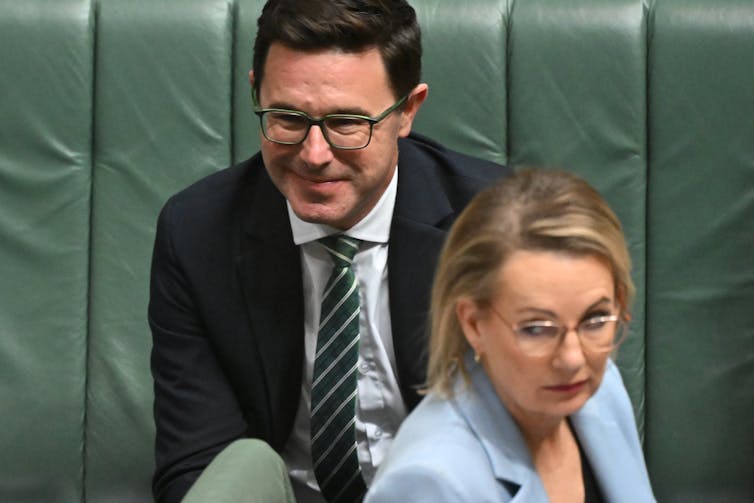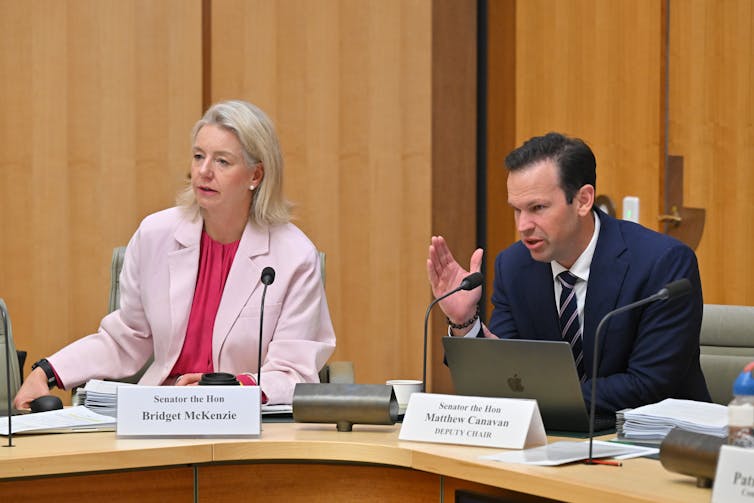Defiant Nationals break with Liberals over hate bill, putting strain on Coalition
- Written by Michelle Grattan, Professorial Fellow, University of Canberra

The Nationals have defied shadow cabinet solidarity, voting in the Senate against the government’s hate crime legislation, which passed late Tuesday night with the support of the Liberals.
The Nationals’ action puts new strain on Coalition relations, and is destabilising for Opposition Leader Sussan Ley, who did the deal with Prime Minister Anthony Albanese to support the legislation in return for concessions.
The four Nationals senators voting against the legislation were frontbenchers Bridget McKenzie, Ross Cadell and Susan McDonald, and backbencher Matt Canavan.
The Nationals’ vote against the bill came after the failure of the party’s amendments to refer the legislation to a committee and to insert more guardrails around the provision enabling hate-promoting organisations to be banned.
Nationals leader David Littleproud said in a statement before the vote, “the Nationals support the intent of the legislation, but we must get it right.

"The legislation needs amendments to guarantee greater protections against unintended consequences that limit the rights and freedom of speech of everyday Australians and the Jewish community,” he said.
“We cannot risk the consequences of getting this legislation wrong.
"If the Nationals’ amendments are not supported in the Senate, the Party will oppose the Bill.”
Littleproud insisted the Nationals’ position “does not reflect on the relationship within the Coalition.
"The Coalition has secured significant improvements to the legislation, but the Nationals’ party room has concluded that more time is required to more fully examine and test the bill before it is finalised.”
How Ley reacts to the Nationals’ action will be a fresh test for her.
Liberal or Nationals backbenchers can vote as they choose without consequences. (Liberal Senate backbencher Alex Antic voted against his colleagues.) But it’s another matter for frontbenchers, who are bound to collective solidarity.
When the Coalition split briefly after the May 2025 election, one issue was the question of solidarity. Ley flagged to Littleproud she would not countenance defiance by Nationals frontbenchers. Littleproud said at the time he had accepted as “more than reasonable” Ley’s requirement for shadow cabinet solidarity.
The extraordinary agonising within the Nationals on Monday and Tuesday over the hate crime legislation underscored the uneasy relationship between the Liberals and their flaky minor partner.
On Sunday, the shadow cabinet arrived at a position on the legislation: Ley negotiated changes with the government on Monday. The resulting agreement to support the bill was then endorsed by a Liberal Party meeting.
But the Nationals, internally split, could not make up their collective mind on whether to support or oppose the bill. In particular, they were unhappy about the breadth of the provision on banning extremist organisations, such as Hizb ut-Tahrir.
Canavan summed up this view when he told the ABC the measure gave the minister “way too much power to ban groups that go far and beyond organisations that would be encouraging or supporting violent acts”.
By lunchtime Tuesday the Nationals had had multiple meetings of their party room.
The back story to their division and dithering was One Nation’s surge, highlighted in two polls at the weekend. In Newspoll, One Nation was polling 22%, above the Coalition on 21%.

With Barnaby Joyce’s defection, the Nationals are increasingly seeing One Nation as an existential threat. They are worried both about the minor party’s support on the ground and the possibility of more defections.
Littleproud’s lack of authority over his party was shown by what happened in Tuesday’s vote on the legislation in the House of Representatives.
Littleproud issued a statement saying the Nationals hadn’t had time to deal with their concerns before the house vote. “Therefore the Nationals’ position is to abstain from voting in the House of Representatives, so that we can put forward amendments to the bill in the Senate to fix these issues.”
Despite this, two Nationals from Queensland, Colin Boyce and Llew O'Brien, voted against the legislation. Former leader Michael McCormack voted for it. In other words, the handful of Nationals in the house spread themselves across all possible positions.
McCormack said later this was the only legislation that would ban Hizb ut-Tahrir and neo-Nazi groups and “I couldn’t in all conscience vote against a bill that does that”.
The Senate early Tuesday evening passed the government’s gun reform legislation, with the Greens voting with the government and the Coalition voting against.

















